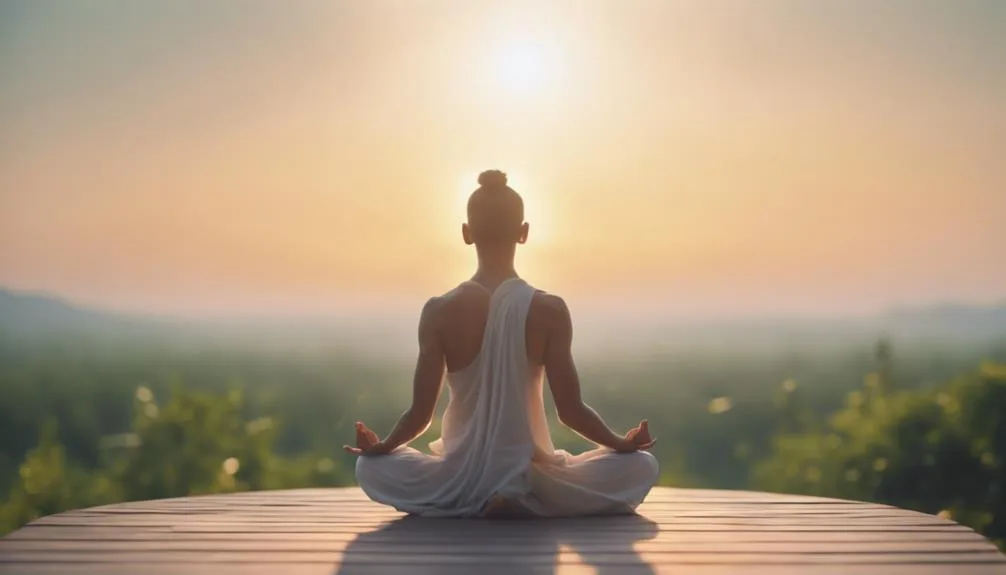In the pursuit of mental tranquility and physical well-being, discerning the nuances between meditation and relaxation becomes pivotal. While both practices are instrumental in mitigating the effects of stress and enhancing life quality, they diverge significantly in approach, objectives, and outcomes.
Meditation, with its roots in ancient traditions, invites a deeper introspection and a structured path toward heightened awareness. Relaxation techniques, conversely, offer a more immediate respite from the physical manifestations of stress.
As we navigate through the intricacies of these practices, a compelling question arises: how do these distinct pathways converge to foster an optimal state of mind and body? This exploration promises to illuminate the unique virtues and synergies of meditation and relaxation, guiding individuals toward a more informed and holistic approach to mental health and well-being.
Key Takeaways
- Meditation enhances focus, emotional balance, and mindfulness, differing from relaxation's immediate stress relief.
- Relaxation techniques offer quick stress management and physical health benefits, acting as a gateway to deeper mindfulness practices.
- Both practices require a conducive environment, regular practice, and tailored techniques for optimal benefits.
- While relaxation provides instant calmness and improved sleep, meditation fosters long-term psychological and emotional well-being improvements.
Setting the Scene
Creating an optimal environment is a crucial first step in the practice of meditation and relaxation, requiring careful consideration of location, lighting, and the minimization of distractions. Choosing an environment conducive to mindfulness involves selecting a space that fosters tranquility and focus.
A calm location, away from the hustle and bustle of daily activities, allows the individual to settle into a meditative state more effortlessly. Additionally, the time of day plays a significant role in enhancing the meditation experience. Opting for moments when external disturbances are minimal—such as early morning or late evening—can further facilitate a deeper connection with one's inner self.
This deliberate approach to setting the scene is foundational in cultivating an effective meditation and relaxation practice.
Combining Techniques
Having established an optimal environment for meditation and relaxation, it is crucial to explore how combining various techniques enhances the overall practice. Integrating mindfulness practice with breathing exercises offers a solid foundation. Meanwhile, guided meditation deepens the experience by leading the practitioner through a series of visualizations or intentions. The body scan technique further complements this by bringing acute awareness to each part of the body, promoting a deeper sense of relaxation and mindfulness.
Key elements to consider when combining techniques:
- Seamless integration of mindfulness practice with breathing exercises
- Incorporation of guided meditation for structured guidance
- Utilization of body scan to enhance bodily awareness
- Tailoring the combination to individual preferences and needs
- Regular practice to observe evolving benefits
Meditation Benefits

Delving into the realm of meditation reveals an array of benefits that extend beyond mere relaxation, encompassing improved mental health, enhanced well-being, and a deeper sense of contentment in life. The practice not only cultivates improved focus but also fosters emotional balance, two critical aspects that contribute to an individual's overall quality of life.
| Benefit | Description |
|---|---|
| Improved Focus | Meditation sharpens the mind, enhancing the ability to concentrate and maintain attention on tasks or activities. |
| Emotional Balance | It equips individuals with the tools to navigate emotional ups and downs more gracefully, promoting resilience. |
| Enhanced Well-being | Regular practitioners report a heightened sense of overall happiness and satisfaction in life. |
This structured approach to understanding meditation's advantages offers insights into how it differs fundamentally from mere relaxation strategies.
Relaxation Advantages
While often overshadowed by the profound benefits of meditation, relaxation techniques offer significant advantages for both mental and physical health, serving as a crucial component of stress management and well-being. These techniques, while simpler, can be a gateway to mindfulness practice, helping to foster a calm mind and inner peace.
- Stress management: Immediate relief from the pressures of daily life
- Ease into mindfulness: Prepares the mind for deeper meditation practices
- Promotes a calm mind: Reduces the mental chatter that disrupts inner peace
- Physical health benefits: Lowers blood pressure and improves sleep patterns
- Accessibility: Simple to practice anywhere, anytime without extensive training
Relaxation isn't just about taking a break; it's a vital practice for maintaining mental clarity and emotional stability.
Progressive Relaxation

Building on the foundational benefits of relaxation techniques, Progressive Relaxation offers a structured approach to reducing stress and enhancing well-being through focused, sequential muscle relaxation. This method not only aids in the release of physical tension but also fosters a deeper mind-body connection, allowing practitioners to achieve a state of profound relaxation and mental clarity.
| Aspect | Impact |
|---|---|
| Sequential Muscle Relaxation | Eases physical tension systematically |
| Mind-Body Connection | Enhances awareness of physiological stress indicators |
| Structured Approach | Facilitates a focused path to relaxation |
| Progressive Techniques | Builds relaxation skills over time |
Progressive relaxation techniques leverage the inherent synergy between the mind and body, promoting a holistic path to stress relief and well-being that underscores the mind-body connection benefits.
Health and Well-being
How do meditation and relaxation practices contribute to enhanced health and well-being?
Both approaches foster significant benefits, albeit through different pathways.
Meditation, with its roots in mindfulness and contemplation, and relaxation techniques, often characterized by physical ease and mental release, both serve as vital components in the holistic improvement of personal health.
Key benefits include:
- Improved focus, enhancing productivity and clarity of thought
- Enhanced emotional balance, promoting resilience in the face of stress
- Reduction in symptoms of anxiety and depression
- Improved sleep quality, contributing to overall health
- Strengthened immune system, reducing the likelihood of illness
Analyzing these practices reveals that, despite their differences, both meditation and relaxation contribute to a foundation of well-being, highlighting the importance of mental and physical health in tandem.
Stress Relief Strategies

Exploring effective stress relief strategies is essential for maintaining the equilibrium between mental and physical health, previously highlighted through the benefits of meditation and relaxation.
Techniques such as mindful breathing and tension release are pivotal in cultivating a calm mind and promoting body relaxation. Mindful breathing acts as a bridge, connecting the mind and body, facilitating a state of awareness that naturally leads to tension release. This conscious awareness helps in identifying stress points within the body, allowing for targeted relaxation practices.
Enhancing Satisfaction
In the quest for enhanced satisfaction in life, meditation and relaxation techniques emerge as pivotal tools, fostering a deeper connection with the self and improving overall well-being. These practices not only offer a path to inner peace but also play a significant role in enhancing fulfillment. By integrating meditation and relaxation into daily routines, individuals can:
- Cultivate a more profound sense of self-awareness
- Reduce stress levels significantly
- Enhance emotional stability
- Improve concentration and focus
- Deepen the connection with one's inner peace
Through analytical and structured approaches, these techniques offer insights into achieving a balanced life, marked by a heightened sense of satisfaction. By prioritizing these practices, individuals can unlock a more fulfilling, serene, and contented existence, underscoring the importance of inner peace in enhancing life's satisfaction.
Frequently Asked Questions
How Do Cultural Differences Impact the Practice and Perception of Meditation and Relaxation?
Cultural differences significantly impact the practice and perception of meditation and relaxation, influencing global mindfulness trends and raising concerns about cultural appropriation. These disparities underscore the need for a respectful integration of diverse meditation practices.
Can Meditation or Relaxation Techniques Worsen Any Mental Health Conditions if Not Practiced Correctly?
Misguided techniques in meditation or relaxation can exacerbate mental health conditions. Professional supervision ensures practices are beneficial, highlighting the importance of guidance in avoiding adverse effects and enhancing mental well-being through these mindful practices.
Are There Any Scientific Studies That Compare the Neurological Effects of Meditation Versus Relaxation?
Yes, numerous scientific studies have examined the differential neurological effects of meditation versus relaxation, revealing distinct patterns in brain activity and stress response, underscoring their unique impacts on mental and physiological health.
How Do Meditation and Relaxation Practices Influence Creativity and Problem-Solving Abilities?
Meditation and relaxation practices significantly enhance creative inspiration and problem-solving techniques by fostering a calm, focused mind conducive to innovative thinking and efficient solution identification, thereby improving overall productivity and mental agility.
What Are the Environmental and Social Factors That Can Hinder the Effectiveness of Meditation and Relaxation Techniques?
Environmental and social factors, such as noise pollution and digital distractions, significantly hinder the effectiveness of meditation and relaxation techniques by disrupting focus and increasing stress levels, thus negating their intended benefits.
Conclusion
In conclusion, the distinction between meditation and relaxation is marked by their unique approaches and benefits towards improving mental and physical health.
Meditation, with its focus on awareness and mindfulness, offers profound psychological benefits, enhancing life satisfaction and reducing anxiety. An interesting statistic from a 2019 study reveals that individuals who practice meditation regularly report a 30% reduction in anxiety levels, underscoring its efficacy.
Relaxation techniques, on the other hand, provide immediate stress relief and physical well-being.
Combining these practices can thus significantly amplify their benefits, offering a comprehensive strategy for achieving optimal health and well-being.

